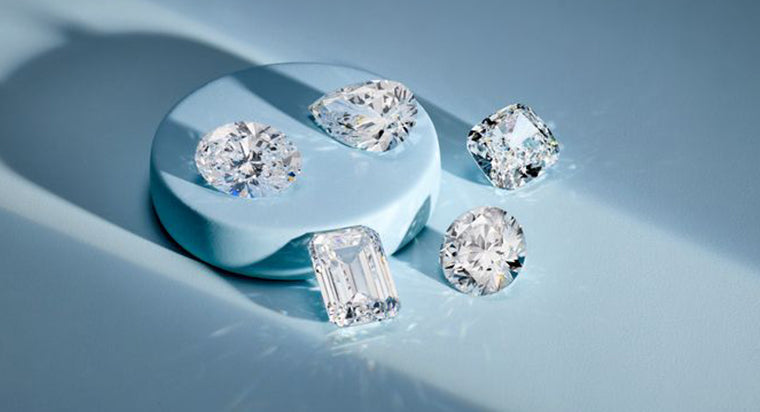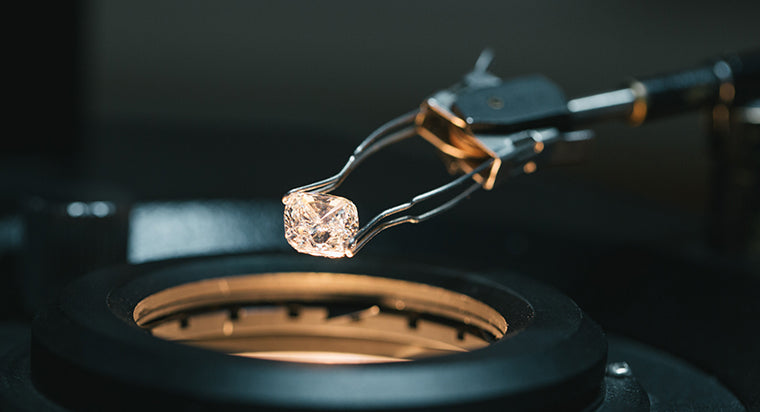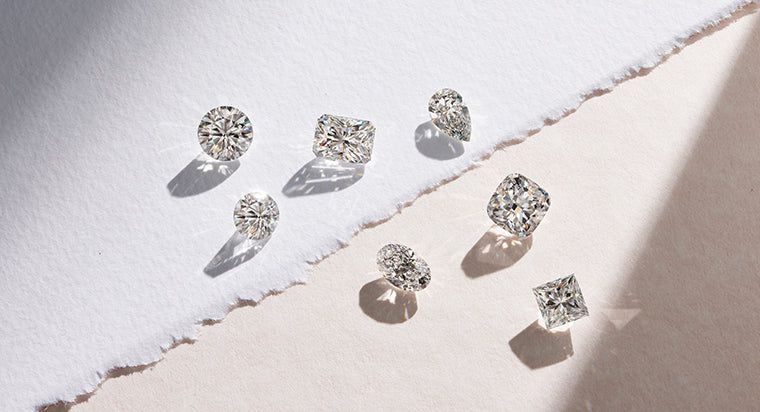What Do Diamonds Symbolize?
You have probably heard the slogan “diamonds are forever,” coined by the De Beers marketing campaign in 1947. The most successful marketing campaign of our day, this slogan is recognizable across America, and has inspired popular culture in various ways, including the film Diamonds Are Forever (1971). Today, diamonds continue to be the most popular engagement ring adornment. As many couples choose alternative wedding styles or engagements, diamond rings persist as the single symbol of endless love. De Beers’ campaign reversed the decline of the diamond market, but the human appreciation for diamonds extends further than an advertising success story.
Apart from the clarity and intense refraction which make the diamond so aesthetically valuable, diamonds hold symbolism today which dates back thousands of years.
Origin of Diamonds Meaning
Ancient Greeks called diamonds adamas, meaning “unconquerables.” Our word adamant derives from this word, and the fictional alloy adamantium, draws on the same idea of hardness and invincibility. Greek mythology and writings tell us that Greek gods wore and used diamonds in their most precious or strong accoutrements. Chronos’ sword, Heracles’ helmet, and Prometheus’ ever-binding chains were all eternally strong because of their diamond composition.
Roman poets adopted this Greek tradition of diamonds as the strongest, most unbeatable substance, by claiming the gates of Hades, which can only be entered after death and can never be exited through, were diamond as well. In medieval Europe, diamonds were referred to as “tears of gods,” and kept as amulets in battle. From the reign of Charlemagne, diamonds gathered increasing popularity among people, who associated diamonds with strength, power, eternal life, and safety. In the age of Louis XIV, Jean-Baptiste Tavernier quested to find jewels for the king and came back with the world’s largest diamond—a whopping 900 carats. This account shows the immense value diamonds had accrued, simply for their beauty and strength. The symbolism of invincibility likely derives from diamonds' property of hardness.
Engagement Ring Tradition Origins
The tradition of giving engagement rings to one’s betrothed dates back to ancient Rome. The Renaissance gives us the first recorded use of a diamond engagement ring. Diamonds were rare and expensive, so simpler metal bands persisted, but those who could afford diamonds preferred them.
Other cultural traditions, such as a Tibetan philosophy of “the Diamond Way,” see the diamond as a symbol of human progress. As a diamond moves from coal to brilliant, long-lasting gem, a human can become refined even with humble beginnings. This philosophy is metaphorical, but many cultures still believe today that diamonds imbue the wearer with power.
Diamond Meaning Associations
Diamonds have been associated with health, representing long life and heart health. Some believe they bestow clarity and rationality on the wearer, while others believe they promise lasting romance. Still others associate diamonds with inner peace, insisting that they represent harmony and beauty within and without. Diamonds are said to represent the perfect form of an individual’s mental state, inspiring the wearer to strive for positivity and joy.
Why do diamonds symbolize love?
From all of these cultural backgrounds, diamonds have come to primarily symbolize eternal love. This concept derives from the concept of strength and invincibility represented by diamonds, combined with the association with engagement. In the Renaissance, some people began to use diamonds in engagement rings because they wanted their marriage bond to be unbreakable. The De Beers campaign monetized on that romantic, loving idea. An unbreakable bond should be sealed by an unbreakable stone. A marriage should be protected by eternal strength.
Looking back as far as Western culture’s beginnings, in ancient Greece, we see the promise of strength and beauty that diamonds offer. Today, nothing has changed. Diamonds remain the pinnacle symbol of eternity, inner strength, and beauty.
What does this mean for lab grown diamonds?
Lab grown (white) diamonds contain the same symbolism and meaning like natural/mined diamonds. Since lab made diamonds have the same physical, chemical, and visual elements like the popular go-to choice, natural diamonds, they also represent a strong, everlasting love. However, there are these distinctive qualities lab diamonds have versus natural diamonds:
- being a more ethical choice (lab diamonds mean guarantee of no mining)
- better for the environment (lab diamonds have a shorter supply chain; therefore less hands it has to go through, to get to the consumer)
- technology enabled (diamonds grown with state-of-the-art equipment)
- budget-friendly (can be 25% to 75% less expensive than mined diamonds)
Diamond Colors Meaning
Diamonds are often clear (white), but other diamond colors exist as well, because of the chemical deposits surrounding them. Individual symbolisms are associated with each color.
- Red diamonds are extremely rare and valuable. Like many other red things, these diamonds symbolize courage.
- Orange diamonds, one of the rarer colored diamonds, are formed with the chemical presence of boron. These diamonds represent energy and enthusiasm.
- Yellow diamonds are the most common of fancy colored diamonds, formed with nitrogen. Yellow diamonds, sometimes referred to as gold diamonds, have been incorporated into some famous jewelry pieces and create some truly unique engagement ring styles. They symbolize happiness and pure friendship.
- Pink diamonds are somewhat rare, incredibly sought after, and timelessly beautiful. Their hue represents joy, romance, and creativity.
- Blue diamonds traditionally symbolize royalty and power, as blue is a color of nobility. The gifting of a blue diamond indicates the highest respect and love for the wearer.
- Brown diamonds carry symbolism of humility and being grounded, as their color emulates the earth below us. Brown diamonds form in the presence of nitrogen and are believed to denote inner strength and balance.
- The mysterious black diamond holds a more austere symbolism, that of sorrow and a yearning for reconciliation.
FAQs
What do diamonds symbolize?
Diamonds symbolize love, commitment, strength, purity, and eternal beauty.
Do lab grown diamonds also symbolize love?
Yes, lab-grown diamonds also symbolize love. Lab-grown diamonds possess the same physical and chemical properties as natural diamonds and are created through a controlled process in a laboratory.
Which color diamonds are rare?
Generally, red and blue diamonds are considered the rarest and most valuable colors. These diamonds are exceptionally rare in nature and command high prices in the market.
Are blue diamonds real?
Yes, blue diamonds are real. They are a rare variety of diamonds that naturally occur in nature. The blue color in diamonds is caused by the presence of trace elements, such as boron, during their formation process.
What are the characteristics of lab grown diamonds?
Lab-grown diamonds possess nearly identical characteristics to natural diamonds. They have the same chemical composition of carbon atoms arranged in a crystal lattice structure, resulting in comparable hardness, brilliance, and fire. Lab-grown diamonds can exhibit a range of clarity and color grades, spanning from flawless to fancy colored diamonds.









